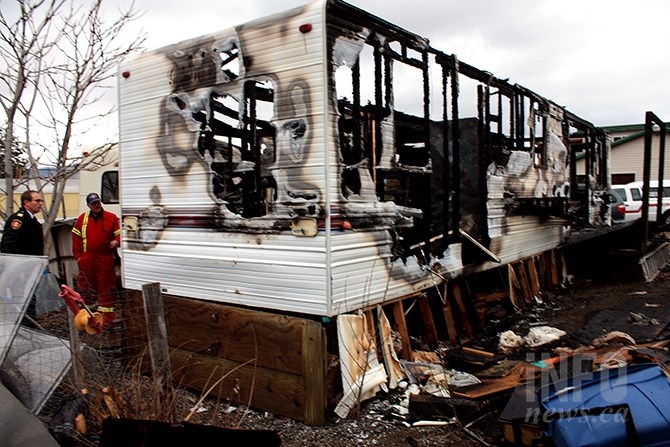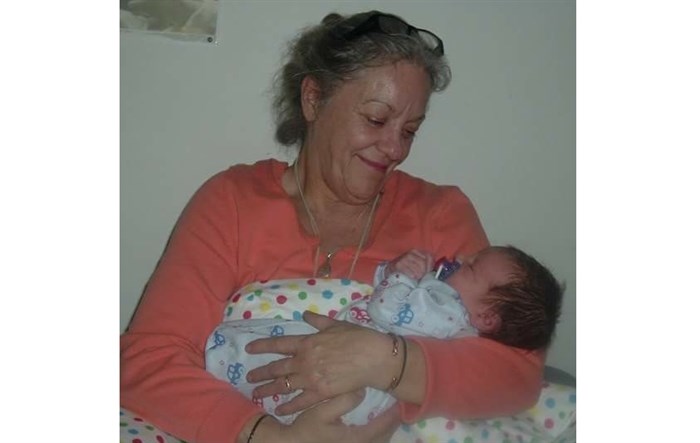
Due to assembly line construction and a preference for lightweight building materials, trailers can become completely engulfed in flames within minutes.
(STEVE ARSTAD / iNFOnews.ca)
August 05, 2019 - 7:00 AM
KAMLOOPS - A fire in a Kamloops mobile home park took the life of Fiona France on July 15 and left a ringing reminder of similar fatal fires in Kelowna and Penticton trailers over the past two years.
Electrical overload, lightweight building materials, and old electrical systems are some of the main reasons why mobile home fires are particularly dangerous.
Bob Dieno, the owner of Nutech Fire Protection and Safety Services, says trailers are much more dangerous than traditional homes when a blaze starts.
“They burn in minutes. It's unbelievable how fast,” says Dieno. “They're made of panel board, they don't have the insulation and the protection in between them. They're not built the same as a house and therefore they go up way, way, faster.”
Dieno says many of the fires sparked in mobile homes are due to electrical issues, such as a lack of outlets.
“One of the issues with older mobile homes is the don't have a lot of plugs in the wall outlets,” Dieno says. “So often, they plug way too many things into them, which overloads circuits and causes fires.”
Doug Wells, an electrical contractor who is a licensed field safety representative with Technical Safety B.C., explains how easy it is for electrical issues to spark a blaze in mobile homes, and how hard it can be to determine what was the cause.
“In the home industry, 40 per cent of fires are because of an unknown cause, and electrical fires fit into that 40 per cent,” Wells says. “About ten to 15 per cent can be attributed to electrical fires, but there's a big unknown...if there's total destruction, it's really hard to determine.”
The investigation by Kamloops Fire Rescue into the cause of the fire that took France’s life has left the family without answers. The cause of the fire was not determined, according to Dean Olstad, chief fire prevention officer with Kamloops Fire Rescue. He says that no evidence of a fire extinguisher or smoke detector was uncovered.

Fiona France was killed during a late-night inferno at her mobile home in a Westsyde trailer park.
Image Credit: FACEBOOK- Fiona France
France’s neighbour, Corrine Ducharme, noted that France did not have insurance on her trailer. When the fire at France’s house jumped to Ducharme’s, she lost much of her property.
“I’m very lucky that I have insurance, I know Fiona did not,” Ducharme says.
France was a newer member of the trailer park, and having insurance would've likely meant that an electrical inspection would've been done upon moving in, according to Wells. He says that trailers moving to a new park or new residents moving into an existing trailer often undergo an inspection to ensure they are up to standards for insurance purposes.
In addition to proper checks and maintenance, Wells urges those in trailer homes to take extreme caution when plugging in appliances. According to Wells, one of the biggest electrical issues in mobile homes is “daisy-chaining” power bars, which homeowners do since there are too few plugs to meet their needs.
“People will buy a power bar from the dollar store, and it's got four outlets on it. That's generally not enough for what they're actually purchasing the power bar for. Generally, they need about six to eight outlets… so they'll plug a power bar into a power bar,” Wells says.
Wells notes that big appliances, like electric heaters and air conditioners, need to be plugged directly into a wall socket and must be the only thing plugged in.
As well as the dangers caused by overloaded circuits, unpermitted construction can cause issues. Wells says that often times, people living in trailer homes will take out a wall to create more space. He says that when that happens, electrical wiring could be taken out of the wall and shoved into another area without much regard for safety. It is unclear if any modifications were done on France’s trailer.
According to Chantille Coates, France’s daughter, her mother’s trailer was an older model. Wells says that older trailers often have exhausted electrical systems.
“Electrical systems are basically designed to last about 30 years, after 30 years, your plugs start wearing out, switches start wearing out, connections become loose,” Wells says. “Because it’s electricity, there's always heat involved. So over thirty years, there's been a lot of load on the circuit.”
Wells notes that trailers differ from stick frames homes as they are built in a factory, and have assembly line workers doing the electrical work.
“Trailers are made in a factory, and they're basically wired by unqualified people,” Wells says. “Because it’s assembly line work, they don't really need a qualified tradesperson.”
Wells says that any work done on a trailer after it leaves the factory must be done by an appropriately certified electrician. Unfortunately, he says, that is not always the case.
In the past five years, 15 people have died in mobile home fires, according to Susan Willams, senior public affairs officer for Emergency Management B.C. She notes that recent fire-related deaths, such as France’s, are not recorded as the report hasn’t come in from officials.
Williams says that 62 of the reported fires in mobile homes in the last five years fall under the Electrical Distribution Equipment or Other Electrical Equipment heading, meaning they were caused by some sort of electrical issue or appliance.
All those interviewed urge mobile homeowners to use properly certified electricians for projects, to use caution when using power bars, and most of all, to have a working smoke detector and fire extinguisher.
You can check out some more fire safety tips here.
— This story was updated at 3:45 p.m. Wednesday, Aug. 7, 2019, to clarify Doug Wells' title.
To contact a reporter for this story, email Jenna Wheeler or call (250) 819-6089 or email the editor. You can also submit photos, videos or news tips to the newsroom and be entered to win a monthly prize draw.
We welcome your comments and opinions on our stories but play nice. We won't censor or delete comments unless they contain off-topic statements or links, unnecessary vulgarity, false facts, spam or obviously fake profiles. If you have any concerns about what you see in comments, email the editor in the link above.
News from © iNFOnews, 2019